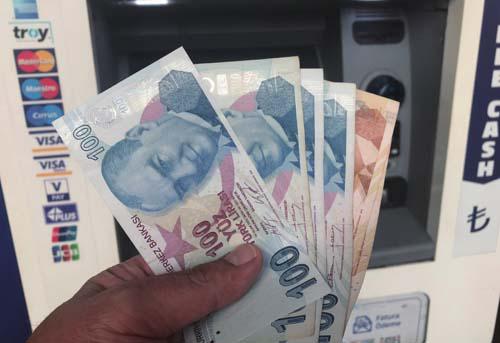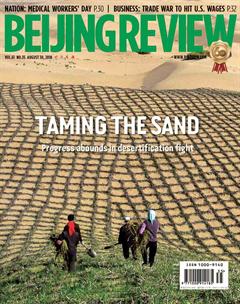Falling Fowl
By Wang Jin

Ankara has maintained close relations with Washington ever since modern Turkey was established in 1924, but recent U.S. sanctions against the country and the free fall of the Turkish lira might spell the end of Turkeys longstanding alliance with the United States. The recent tension between the two countries was catalyzed by the arrest of American pastor Andrew Brunson, but can also be perceived as the consequence of Turkeys national transformation from a “Western nation”to an “Eastern state,” led by President Recep Tayyip Erdogan and his Justice and Development Party (AKP) according to the principles of neo-Ottomanism.
Turkish-U.S. divide
The depreciation of the Turkish lira during the past few weeks is the direct result of economic sanctions by Washington. The basis for these measures is the imprisonment of Brunson, an American pastor who was detained in October 2016, and the breakdown in negotiations for his release in late July. On August 1, the Treasury Department of the United States announced that it would freeze the assets of two of Turkeys government ministers over Brunsons continued detention. U.S. Congress is pushing for a slew of separate sanctions, including halting the delivery of F-35 fighter jets and blocking funding to Turkey from the World Bank and the International Monetary Fund. Washingtons inclusion of Turkey in its trade war with China and the EU, and Ankaras resistance to U.S. sanctions against Iran have both made the liras depreciation inevitable.
The detention of Brunson represents a microcosm of Turkey and the United Statesrugged bilateral relations. Ever since July 2016, after a failed military coup against Erdogan and the AKP, the hostility and distrust between Ankara and Washington have intensifi ed. Ankara believes that Washington was behind the coup attempt and gave refuge to the leader of the rebellion, Fethullah Gulen, although the White House has denied this. Ankara maintains that Gulen still operates and has influence over a “state within Turkey” and upholds that Brunson is an important actor in this “state.” Brunsons release has therefore become all but impossible given the massive loss of prestige this would entail for Erdogan and his ruling AKP government if he appeared to be caving in to U.S. pressure.
Also fueling tensions is Washingtons support for Kurdish militants in northern Syria. The Kurdish Democratic Union Party (PYD), which controls a large area in northeastern Syria, has been perceived by Ankara as an extension of the Kurdish Workers Party (PKK), considered a terrorist group by the Turkish Government. Washington, on the contrary, perceives the PYD as an important ally and partner that is able to resist the expansion of Islamic extremism in northern Syria. Turkey has successfully launched several massive military offensives in northern Syria since the start of 2018 alongside its pick of Syrian rebel groups, so while the U.S. military presence in northeastern Syria also continues, the tension and distrust between Washington and Ankara look sure to continue.
Turkeys new identity
The past two decades have also witnessed the transformation of Turkeys national identity. Modern Turkey was established after the First World War when the Ottoman Empire, which upheld the ideology of pan-Islamism to portray itself as the protector of Muslims, collapsed. While ostensibly the Ottoman Empire was defeated in battle by the United Kingdom, France and other European powers, its demise was also the result of internal divisions, particularly the disharmony between Turks and Arabs.
In the late 19th century, the Ottoman Empire lost most of its European territories as Christian groups in Anatolia and Thrace came under the influence of the national strategies of Russia, the AustroHungarian Empire, France and other Western powers. At this time, Islamic thinkers such as Jamal Din Afghani and Muhammad Abduh maintained that only“Islamic belief” could unite all ethnic groups under the same banner to safeguard the “Caliphate,” led by the Ottoman Sultan in Istanbul, against invasion and humiliation by Western powers. It was against this backdrop that the Sultan decided to strengthen the Ottoman Empire by augmenting a pan-Islamic political ideology.
However, during World War I, while the Sultan was calling upon Muslims to unite to resist the United Kingdom, France and Russia under the banner of jihad, or holy war, the divisions inside the Muslim world were becoming more entrenched. In 1917, the Arab Revolt led by the Emir of Mecca in the Arab Peninsula, Hussein Ibn Ali, dealt a serious blow to Ottoman illusions of panIslamism. Hussein Ibn Ali, supported by the United Kingdom, led his Arab forces to occupy a large region in the southern Ottoman Empire, while many important sites and regions such as the Islamic holy cities of Mecca and Medina, Damascus, Baghdad, Mosul, Homs and Jerusalem were occupied either by Arab militants or British Expeditionary Forces.
Following World War I and the failure of pan-Islamism, the Ottoman Empire was left with control over only its Anatolian territories. In a crisis of national identity, it became important for people living in this reduced state to redefine who they were and to fill the void left by the destruction of the pan-Islamic vision. Mustafa Kemal Atatürk redefined modern Turkey as a country characterized by scientifi c, Western and developed characteristics, rather than the backward, Eastern, undeveloped traditions of its past. After the 1920s, Turkey perceived itself as a part of the Western world rather than as an Eastern state. Religion became separated from politics and was confined to the mosques, while the Caliph was ousted and a new modern political system was established in the country.
After World War II, Turkey chose to join NATO to resist the threat from its northern neighbor, the Soviet Union. In recent decades, Turkey has persistently sought to become a bona fi de European state by joining fi rst the European Community and later the European Union. Turkey and the United States developed a close relationship as Ankara became subservient to Washington and the governments of other European nations.
Since 2002, Turkeys national identity has been infl uenced by the neo-Ottomanism upheld by the AKP government. NeoOttomanism is essentially the fusion of pan-Islamism and pan-Turkism, the former of which drives Turkey to become involved in regional issues in the Middle East, while the latter underpins Ankaras willingness to offer assistance to Turkish ethnic groups around the world. It is against this backdrop that Turkey, following the turbulence of 2011 when the Arab Spring swept across the Middle East, decided to become involved in the Syrian Civil War, the SaudiQatar crisis, the Libyan Civil War and other regional confl icts.
Neo-Ottomanism has awakened Turkey to a new national identity, and Ankara is no longer willing to continue in a submissive role with its Western partners. From Ankaras decision to suspend negotiations over EU membership to escalating tension with the United States, Ankara is becoming ever more independent in its foreign policy.
While Turkeys “eastward” policy means uniting more closely with Russia, it is wrong to imagine that Turkey will become submissive to Moscow as it once was to the West. An increasingly confident Turkey is rising, and it will have an important role to play in the increasingly intricate arena of geopolitical competition.

